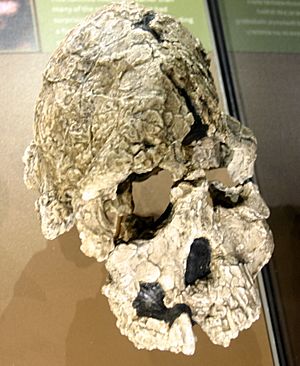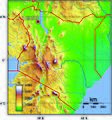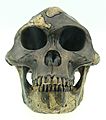Kenyanthropus platyops facts for kids
Quick facts for kids Kenyanthropus platyopsTemporal range: Pliocene
|
|
|---|---|
| Scientific classification | |
| Kingdom: | |
| Phylum: | |
| Class: | |
| Order: | |
| Family: | |
| Subfamily: | |
| Genus: |
Kenyanthropus
|
| Binomial name | |
| †Kenyanthropus platyops Leakey et al., 2001
|
|
Kenyanthropus platyops was an ancient type of human ancestor. It is now extinct, meaning it no longer lives on Earth. Scientists found its fossils in 1999 near Lake Turkana in Kenya, Africa. The name Kenyanthropus platyops means "flat-faced human from Kenya."
Contents
About Kenyanthropus platyops
Discovery and Features
A team led by Meave Leakey found the first fossils of Kenyanthropus platyops. A person named Justus Erus discovered them. These fossils are very old, about 3.5 to 3.2 million years old.
The most important fossil is a skull. It shows that Kenyanthropus platyops had a wide, flat face. This is different from many other early human ancestors. Scientists also found a toe bone. This bone suggests that Kenyanthropus platyops probably walked upright, just like modern humans.
Its teeth were also interesting. They were somewhere between the teeth of modern humans and those of apes. This mix of features makes Kenyanthropus platyops unique.
What Scientists Think
Scientists who study ancient humans are called paleoanthropologists. They have different ideas about Kenyanthropus platyops.
Meave Leakey, who found the fossil, thought it was a completely new type of human ancestor. She believed it belonged to a new genus (a group of related species).
However, other scientists have different opinions. Some think it might be a different species of Australopithecus, called Australopithecus platyops. Australopithecus is another well-known group of early human ancestors.
Still others believe the fossil might just be an individual of Australopithecus afarensis. This is the species that the famous "Lucy" fossil belongs to.
It is hard to be sure because the main fossil skull is damaged. It has many cracks filled with dirt, which makes it difficult to study its exact shape. Because of this, some experts are not sure if Kenyanthropus is a true, separate species.
Images for kids
-
Location of Lomekwi, on the western shore of Lake Turkana, Kenya
-
Kenyanthropus was contemporary with A. afarensis ("Lucy" above)
See also
 In Spanish: Kenyanthropus platyops para niños
In Spanish: Kenyanthropus platyops para niños
 | Anna J. Cooper |
 | Mary McLeod Bethune |
 | Lillie Mae Bradford |




